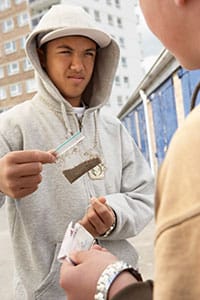As a parent, there is such a thing as overkill: hovering like a helicopter parent, restricting independence because you worry, never trusting your child. Being a good parent means finding a balance between trusting your child to make the right choices and keeping him safe from danger. Few things are scarier than the idea of your teen using drugs. Experimenting with drugs can lead to other very bad and destructive choices, addiction, and even death from overdose. If your instincts are telling you that something is going on and you suspect drug use, act immediately. Your teen will likely lie about using drugs. He knows he is not supposed to and if you confront him, be prepared for the possibility that he will not be honest.
The Lies
Teens using drugs can come up with numerous, creative lies. Professionals working as drug counselors, leading support groups, and working in addiction treatment centers know the lies well and have experience picking up on them. If you are a parent, however, these lies are probably new to you and it may be hard to initially accept that your child is making poor decisions and then lying to you about them. This is normal behavior, though. According to a study about teens and drugs, they will lie even when they are not at risk of getting caught. Researchers asked 400 teen participants if they had used cocaine. They then tested them using a hair sample. The teens were told that their answers would be kept confidential, and yet the results found that many of them denied using the drug, even though the test confirmed its presence.
What to Do
The worst thing you can do is ignore the problem. Not taking action when you suspect your child is using drugs is dangerous. Stop the problem as early as you can to help save his life. Here are some things to remember:
- Trust your instincts to tell you the truth about your child. If your teen is making excuses that just don’t seem right, investigate further. Get to know his friends. Talk to him regularly. Most importantly, observe his behaviors, habits and health. When you notice changes that you cannot explain, you may need to take action.
- Educate yourself about what drug abuse looks like. Read up on the side effects and the behavioral changes you may see in a teen who is using drugs. The signs can be subtle and vary from one person to the next. Knowledge is power and will help you identify a problem before it gets out of hand.
- Check your emotions. When the realization hits you that your teen is using drugs and lying to you about it, you may feel angry, upset, depressed, or a whole host of other emotions. While these feelings are understandable, they will not help you get him help. Remain calm and remember that lying, although not acceptable, is normal in a teen.
- Get expert help. You can only do so much for your teen. Drug abuse is a serious issue and one that requires the assistance of professionals. Start with your family doctor and get recommendations for how to approach your teen and how to get him help.
- Rebuild trust. One of the most hurtful aspects of this situation for you will be the fact that your child lied to you and attempted to deceive you. It will be difficult to trust him again, but in order to rebuild your relationship, you will need to start with trust. While you may not be prepared to let him go out all night with friends, you need to trust him with some level of independence. Otherwise, the negative tone of your relationship will persist for years to come. Start small and make sure your child understands that he needs to earn back your trust. It is not an automatic right.
Drug abuse is a terrible thing to befall any family. As a parent, knowing that your child is in danger and is deceiving you can be heartbreaking. The most important things to do are to trust your instincts, get him help, and build your relationship back up with trust and communication.

